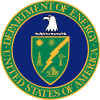
The United States Department of Labor (DOL) is one of the executive departments of the U.S. federal government. It is responsible for the administration of federal laws governing occupational safety and health, wage and hour standards, unemployment benefits, reemployment services, and occasionally, economic statistics. It is headed by the Secretary of Labor, who reports directly to the President of the United States and is a member of the president's Cabinet.

The United States Department of Justice (DOJ), also known as the Justice Department, is a federal executive department of the United States government tasked with the enforcement of federal law and administration of justice in the United States. It is equivalent to the justice or interior ministries of other countries. The department is headed by the U.S. attorney general, who reports directly to the president of the United States and is a member of the president's Cabinet. The current attorney general is Merrick Garland, who has served since March 2021.

The Department of the Treasury (USDT) is the national treasury and finance department of the federal government of the United States, where it serves as an executive department. The department oversees the Bureau of Engraving and Printing and the U.S. Mint. These two agencies are responsible for printing all paper currency and minting coins, while the treasury executes currency circulation in the domestic fiscal system. The USDT collects all federal taxes through the Internal Revenue Service; manages U.S. government debt instruments; licenses and supervises banks and thrift institutions; and advises the legislative and executive branches on matters of fiscal policy. The department is administered by the secretary of the treasury, who is a member of the Cabinet. The treasurer of the United States has limited statutory duties, but advises the Secretary on various matters such as coinage and currency production. Signatures of both officials appear on all Federal Reserve notes.
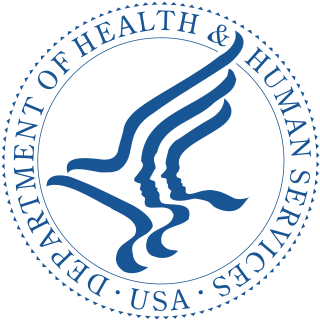
The United States Department of Health and Human Services (HHS) is a cabinet-level executive branch department of the U.S. federal government created to protect the health of the U.S. people and providing essential human services. Its motto is "Improving the health, safety, and well-being of America". Before the separate federal Department of Education was created in 1979, it was called the Department of Health, Education, and Welfare (HEW).

The United States Department of Energy (DOE) is an executive department of the U.S. federal government that oversees U.S. national energy policy and manages the research and development of nuclear power, the military's nuclear weapons program, nuclear reactor production for the United States Navy, energy-related research, and domestic energy production and energy conservation.
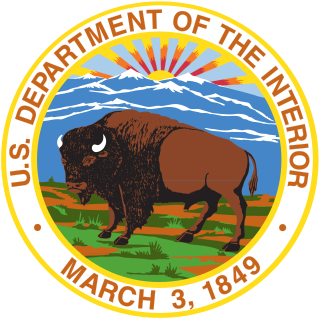
The United States Department of the Interior (DOI) is one of the executive departments of the U.S. federal government headquartered at the Main Interior Building, located at 1849 C Street NW in Washington, D.C. It is responsible for the management and conservation of most federal lands and natural resources, and the administration of programs relating to Native Americans, Alaska Natives, Native Hawaiians, territorial affairs, and insular areas of the United States, as well as programs related to historic preservation. About 75% of federal public land is managed by the department, with most of the remainder managed by the Department of Agriculture's Forest Service. The department was created on March 3, 1849.

The United States Department of Housing and Urban Development (HUD) is one of the executive departments of the U.S. federal government. It administers federal housing and urban development laws. It is headed by the Secretary of Housing and Urban Development, who reports directly to the President of the United States and is a member of the president's Cabinet.
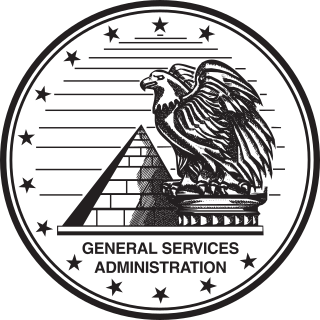
The General Services Administration (GSA) is an independent agency of the United States government established in 1949 to help manage and support the basic functioning of federal agencies. GSA supplies products and communications for U.S. government offices, provides transportation and office space to federal employees, and develops government-wide cost-minimizing policies and other management tasks.
In the United States, Office of Inspector General (OIG) is a generic term for the oversight division of a federal or state agency aimed at preventing inefficient or unlawful operations within their parent agency. Such offices are attached to many federal executive departments, independent federal agencies, as well as state and local governments. Each office includes an inspector general and employees charged with identifying, auditing, and investigating fraud, waste, abuse, embezzlement and mismanagement of any kind within the executive department.

The Office of Legal Counsel (OLC) is an office in the United States Department of Justice that assists the Attorney General's position as legal adviser to the President and all executive branch agencies. It drafts legal opinions of the Attorney General and provides its own written opinions and other advice in response to requests from the Counsel to the President, the various agencies of the Executive Branch, and other components of the Department of Justice. The Office reviews and comments on the constitutionality of pending legislation. The office reviews any executive orders and substantive proclamations for legality if the President proposes them. All proposed orders of the Attorney General and regulations that require the Attorney General’s approval are reviewed. It also performs a variety of special assignments referred by the Attorney General or the Deputy Attorney General.

The energy policy of the United States is determined by federal, state, and local entities. It addresses issues of energy production, distribution, consumption, and modes of use, such as building codes, mileage standards, and commuting policies. Energy policy may be addressed via legislation, regulation, court decisions, public participation, and other techniques.

The Organized Crime Drug Enforcement Task Force (OCDETF) is a federal drug enforcement program in the United States, overseen by the Attorney General and the Department of Justice. The principal mission of the OCDETF program is to identify, disrupt, and dismantle the major drug trafficking operations and tackle related crimes, such as money laundering, tax and weapon violations, and violent crime, and prosecute those primarily responsible for the nation's drug supply.
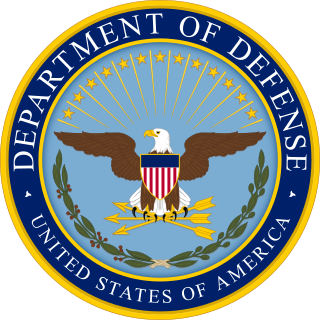
The United States Department of Defense is an executive branch department of the federal government of the United States charged with coordinating and supervising all agencies and functions of the U.S. government directly related to national security and the United States Armed Forces. As of June 2022, the U.S. Department of Defense is the largest employer in the world, with over 1.34 million active-duty service members, including soldiers, marines, sailors, airmen, and guardians. DoD also maintains over 778,000 National Guard and reservists, and over 747,000 civilians bringing the total to over 2.87 million employees. Headquartered at the Pentagon in Arlington County, Virginia, just outside Washington, D.C., DoD's stated mission is to provide "the military forces needed to deter war and ensure our nation's security".

The Office of Intelligence and Counterintelligence (OICI), also abbreviated IN, DOE-IN, DOE/IN, I&CI, or OIC, was established in 2006 by the merger of pre-existing Energy Department intelligence and security organizations. It is an office of the United States Department of Energy (DOE) responsible for all intelligence and counterintelligence activities throughout the DOE complex; due to this central role, OICI is designated DOE's Headquarters Intelligence. As a component of the United States Intelligence Community in addition to the Department of Energy, OICI reports to both the Director of National Intelligence and Secretary of Energy.

The Department of Homeland Security Office of Inspector General was established along with the Department of Homeland Security itself in 2002 by the Homeland Security Act. Its website describes its mission as "supervis[ing] independent audits, investigations, and inspections of the programs and operations of DHS, and recommends ways for DHS to carry out its responsibilities in the most effective, efficient, and economical manner possible."

The Executive Office for Immigration Review (EOIR) is a sub-agency of the United States Department of Justice whose chief function is to conduct removal proceedings in immigration courts and adjudicate appeals arising from the proceedings. These administrative proceedings determine the removability and admissibility of individuals in the United States. As of January 19, 2023, there were sixty-eight immigration courts and three adjudication centers throughout the United States.
The Council of the Inspectors General on Integrity and Efficiency (CIGIE) addresses integrity, economy, and effectiveness issues that transcend individual Government agencies; and increase the professionalism and effectiveness of personnel by developing policies, technical standards, and approaches to aid in the establishment of a well-trained and highly skilled workforce in the Office of Inspector General. CIGIE was established in October 2008 as an independent entity within the United States executive branch by the Inspector General Reform Act (IGRA).

The U.S.Department of Agriculture Office of Inspector General is one of the Inspector General offices created by the Inspector General Act of 1978. The Inspector General for the Department of Agriculture is charged with investigating and auditing department programs to combat waste, fraud, and abuse. A component of USDA-OIG, the Office of Investigations, conducts criminal investigations led by USDA-OIG Special Agents.

The U.S.Department of Education Office of Inspector General is an Inspector General office created by the Department of Education Organization Act. The Inspector General for the Department of Education is charged with investigating and auditing department programs to combat waste, fraud, and abuse.
The U.S.Department of Housing and Urban Development Office of Inspector General is one of the Inspector General offices created by the Inspector General Act of 1978. The Inspector General for the Department of Housing and Urban Development is charged with investigating and auditing department programs to combat waste, fraud, and abuse.

















